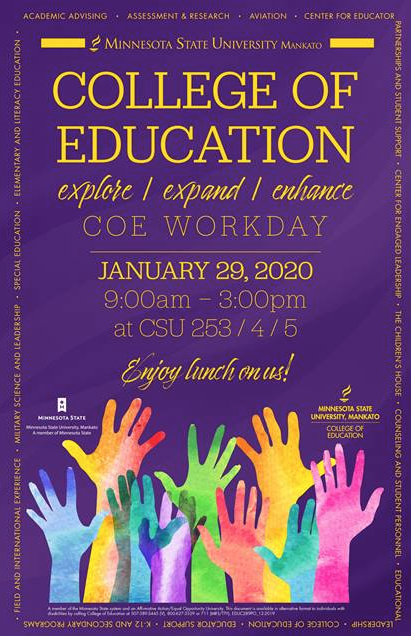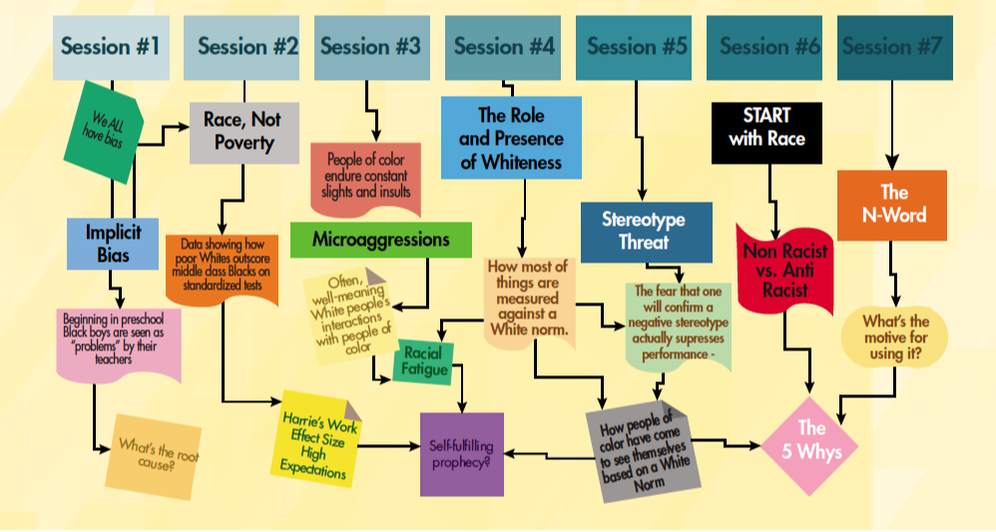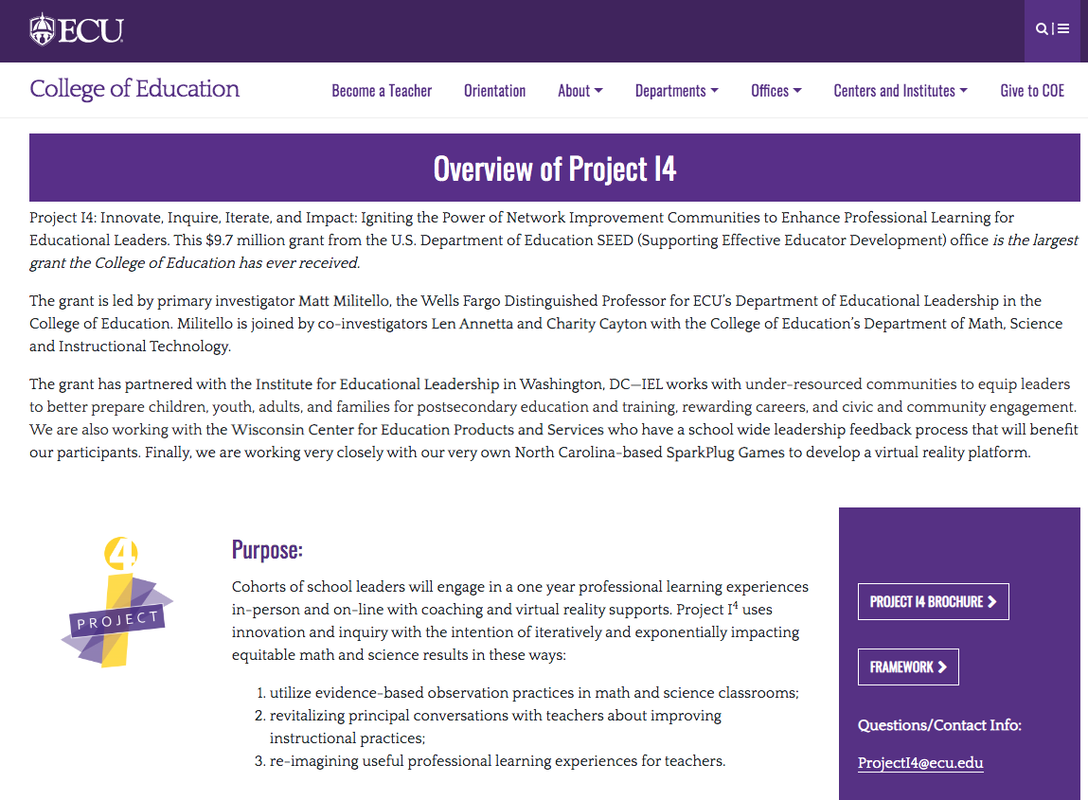|
Your browser does not support viewing this document. Click here to download the document.
|
Excellence in Equity Innovation Award - Minnesota State Colleges and Universities Dr. Candace Raskin and I were asked to craft an application for this award. The narrative of the application outlined the racial equity work being done in the Department of Educational Leadership. While it necessitated a very quick turn around time, we were able to tell the story of the mission and vision of the department complete with written testimonials from graduate students. Frankly, the story was easy to write because the work has been and continues to be so compelling. |
|
Chair, Curriculum and Instruction Advisory Board
As the chair, my charge is to: Guide the college with instructional and curricular changes that reflect research-based decision making, support state licensing requirements, reflect 21st century learning principles/skills, and address student learning outcomes, assessment for learning and effective teaching. This is aligned with Goal 2 of the College of Education: Increase the ability to practice racial equity among faculty, staff, students, and partners by examining existing systems and structures. The nexus of these two pieces is a place where instructors can intentionally insert issues of race into their curriculum and classroom instruction. In response, the members of the CIAB and I created a repository of racial equity classroom resources, groundings, and strategies and made it available to all COE instructors via OneNote. |
Your browser does not support viewing this document. Click here to download the document.
|

Member, Leadership Council
Planning and facilitating College of Education Workday
COE Workday Slides
I was responsible for a large portion of the interactive components of the workday. In it, we revisited and re-established the use the Courageous Conversation Protocol for our work in classes as well as department meetings.
Faculty participants engaged in fun team-building activities, a session on making the invisible visible - an exercise about microaggressions. and an examination of what might be stopping us as individuals and as departments from fully embracing and enacting the work of racial equity in our spheres of influence.
The workday's activities and reflections were well received. I realized that faculty, like any other humans, appreciate the opportunity to explore and "play with" new ideas, terms, and curriculum in a safe environment in order to consider adopting them for themselves.
Consultant and Facilitator, Owatonna's Vision for Racial Equity
I, along with Dr. Jinger Gustafson, partnered with Owatonna Public Schools under the leadership of Superintendent Jeff Elstad to provide professional development to a strategic group of people. First, we provided monthly 90-minute sessions to district leadership (principals, assistant principals, directors, etc.). Our next efforts were geared for educators (teachers, counselors, social workers, paraprofessionals, building and grounds, transportation, etc.). We then prepared specialized curriculum for the Owatonna Community Leaders (busineses, health and human services, local government, clergy, etc.). Finally, we were asked to present sessions to the Owatonna School Board. We covered a variety of thought and conversation provoking topics and created the space for learning, reflection, and action. Below is a flow chart of some of the interlocking topics we presented. We were featured in the spring 2020 Partnership magazine.
I, along with Dr. Jinger Gustafson, partnered with Owatonna Public Schools under the leadership of Superintendent Jeff Elstad to provide professional development to a strategic group of people. First, we provided monthly 90-minute sessions to district leadership (principals, assistant principals, directors, etc.). Our next efforts were geared for educators (teachers, counselors, social workers, paraprofessionals, building and grounds, transportation, etc.). We then prepared specialized curriculum for the Owatonna Community Leaders (busineses, health and human services, local government, clergy, etc.). Finally, we were asked to present sessions to the Owatonna School Board. We covered a variety of thought and conversation provoking topics and created the space for learning, reflection, and action. Below is a flow chart of some of the interlocking topics we presented. We were featured in the spring 2020 Partnership magazine.
|
Lead Coordinator, 7th Annual Leading Courageously for Racial Equity
As this was my third time coordinating this event, some things were easier because I along with others had put some systems and protocols in place. This year, however, held some unforseen challenges that required me to learn new aspects of the production of this conference including tracing registration finances and web development. All in all, I appreciated the knowledge and skills gained and will employ them as I prepare for next year's conference. I have included as artifacts the coordinated workstream chart outlining timelines and tasks, the produced video clip with conference highlights, and the registration website graphics. |
Your browser does not support viewing this document. Click here to download the document.
Project I4 - A collaboration with East Carolina University, Greenville, North Carolina
As a coach, I worked with principals both in North Carolina and the Bay Area of Califorina to improve their ability to conduct evidence-based classroom observations and to hold more effective equity-based conversations with their teachers to improve instruction in mathematics and science classes. My Equity-Centered Network Improvement Community (EC-NIC) consisted of six principals met monthly - once as a group and then individually – via Zoom for an entire year that culminated with each of them producing a capstone presentation of how this coaching has impacted the math data in their buildings based on a nationally-normed schoolwide survey. Without exception, schools showed improvement. I also had the tremendous opportunity to meet other educational leadership practitioners from all over the country and have grown in the depth and breadth of my own practice to inform established and aspiring principals. The link below describes the project and its team members.
Project I4 Team
As a coach, I worked with principals both in North Carolina and the Bay Area of Califorina to improve their ability to conduct evidence-based classroom observations and to hold more effective equity-based conversations with their teachers to improve instruction in mathematics and science classes. My Equity-Centered Network Improvement Community (EC-NIC) consisted of six principals met monthly - once as a group and then individually – via Zoom for an entire year that culminated with each of them producing a capstone presentation of how this coaching has impacted the math data in their buildings based on a nationally-normed schoolwide survey. Without exception, schools showed improvement. I also had the tremendous opportunity to meet other educational leadership practitioners from all over the country and have grown in the depth and breadth of my own practice to inform established and aspiring principals. The link below describes the project and its team members.
Project I4 Team
|
School of Applied Science (Polytech) workgroup
Because of my experience of starting an urban high school STEM academy, Brian Martenson approached me to serve on a workgroup to explore the possibility of creating the School of Applied Science (Polytech): Administered by the Dean of CSET. Among other things, the work group's charge was to: · Discuss what needs to be developed for the school to succeed (curriculum, programming, student services, faculty support, new resources, etc.) · What external stakeholders, potential partners, potential donors should be engaged in the process and continuing over time? · How might this school contribute to our Equity 2030 and other Diversity/Equity/Inclusion efforts? What supports would be necessary for that? As a result of my work with this group, I gained an understanding and appreciation for collaboration across several departments and colleges - each with a diverse set of ideas and perspectives of what is valued in terms of applied science. We will resume this workgroup in fall 2020 to bring some of our recommendations to fruition. |
Your browser does not support viewing this document. Click here to download the document.
|
|
Your browser does not support viewing this document. Click here to download the document.
|
University of Minnesota College of Education & Human Development Dean's Advisory Board Member As a member since the fall of 2010, I have had the privilege of serving and contributing to a college that emphasizes equity, inclusion, and service to the state. I have had the pleasure of contributing my time, talents, and experience to further advance the vision and mission of the college. This included writing letters to legislators to ask for increased funding, working on equity taskforces, and doing voiceover and on-camera work to promote awarness of programs on behalf of the college. I've learned so much about what it takes to consider the various aspects of successfully leading a college. Dean Jean Quam retired in July of 2020. At that time, I, too, concluded my service as a board member. |
Proudly powered by Weebly


